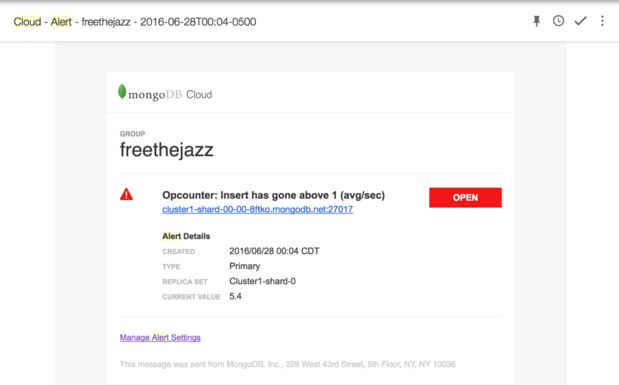Review: MongoDB Atlas shoulders the ops burden
Flexible configuration, rich tooling, and great pricing make MongoDB's DBaaS offering an instant winner
-
MongoDB Atlas
I’ve often wondered why so many of the companies behind popular open source databases—such as MongoDB—leave it to others to provide their database as a managed cloud service. After all, who could do a better job of operating a database than the people who build, support, and maintain it?
Apparently, I’m not the only one to get this bright idea. Yesterday, MongoDB released its own DBaaS (database as a service) offering called MongoDB Atlas.
Available immediately, Atlas aims to provide an easy, cost-effective, and production-ready alternative to running MongoDB on your own hardware or using other DBaaS offerings. We’ve been playing around with Atlas at InfoWorld for the last few weeks and wanted to give you a close look at what the company behind MongoDB has come up with.
MongoDB Atlas is a fully managed cloud service that covers deployment, maintenance, backups, monitoring, and alerting of MongoDB clusters. If you’ve been keeping up with MongoDB (the company) the past few years, you know that many of these capabilities are already available as stand-alone products or cloud services. In fact, products like Ops Center and Cloud Manager cover nearly all of these use cases already.
The big difference between the existing services and MongoDB Atlas is that Atlas simplifies the entire lifecycle by taking care of low-level configuration and maintenance tasks. Atlas makes it vastly easier to manage a MongoDB deployment. The tradeoff is that you forgo the ability to heavily customize it.

MongoDB Atlas is a fully managed cloud service that covers deployment, maintenance, backups, monitoring, and alerting of MongoDB clusters.
MongoDB at your service
Atlas sacrifices configurability for ease of use, but that doesn’t mean it’s not configurable. In fact, with only a few exceptions it appears to be more configurable than competitors Compose, mLab, and ObjectRocket. Storage size is tunable for all instance types, and so is storage speed on larger instance types. The ability to toggle encrypted storage volumes is the de facto standard, and Atlas matches its competitors here.
Atlas also lets you customize the size of your replica set (three, five, or seven copies), create a sharded cluster, and specify how many shards you want. Once you’ve selected your ideal settings, just click Confirm & Deploy, and Atlas does the work for you. It takes some time, but if you’ve ever provisioned new EC2 instances on AWS, you’ll feel right at home.

MongoDB Atlas lets you customize storage size and even storage speed for your instances, with the pricing impact clearly communicated.
When the deployment is complete, you’ll have access to metrics, IP whitelisting for connecting to the database, and the ability to reconfigure the deployment. If you realize at this point that you actually wanted five replicas instead of three, no problem. You can easily make the change and wait for the update to take effect.
You’re going to want to take advantage of the alerting capabilities that Atlas inherited from Cloud Manager. A handful of alerts are configured out of the box for you, like high disk space utilization, high IO utilization, and credit card expirations, and adding custom alerts is a breeze. Expecting a steady write load? Have Atlas send you an alert if the insert count drops below an average of 50 per second for more than 10 minutes. Want to be notified of inefficient queries? Set up an alert to let you know when the average b-tree miss ratio goes above a certain threshold. In addition to email and SMS, alerts can be sent via several other integrations including HipChat, Slack, and PagerDuty.

Atlas makes it easy to configure custom alerts. This one helps to detect inefficient queries in need of an index.
The pricing for Atlas blows its competitors out of the water. Depending on your cluster configuration, you might find your bill is half or even a quarter the price it would be if you chose a different service provider. A 4GB replica set with 40GB of storage costs between $730 and $750 per month at Compose or ObjectRocket, but Atlas will give it to you for just over $160. For a 4GB replica set with 60GB of storage, mLab charges $360 to Atlas’ $170. Those prices seem even more ridiculous when you consider that Atlas offers replica sets with three data-bearing nodes, whereas the others include only two data-bearing nodes. One important note on pricing is that backups are a la cart in Atlas, whereas its competitors include backups in the cost of the offering. At $2.50 per gigabyte per month, this could impact your bill in a significant way.
A few blemishes
When it comes to deployment targets, Atlas has some ground to cover to catch up with its competitors. You can choose from seven internationally distributed availability zones on AWS when deploying a cluster with mLab. Atlas supports four, but if you want to deploy multiple clusters to different regions you’re stuck creating separate groups for each region. Additionally, mLab supports deploying to Google Cloud Engine and Microsoft Azure in addition to AWS, while Atlas supports only AWS at the time of launch. Both Google and Azure are on the roadmap for Atlas, but MongoDB has yet to announce target dates for these milestones.

Atlas could use a little more polish in places. For instance, you would think that a big red button labeled OPEN would open something. It doesn’t.
Although the Atlas UI has a clean, modern look and the UX is mostly straightforward, there remains a good bit of cleanup work to tie things down. When you step through a configuration change or deployment, for example, Atlas doesn’t display the current step within context of the full list of actions that need to be performed, leaving you in the dark about how long the process might take.
Curiously, if you make modifications to two separate clusters simultaneously, Atlas appears to serialize the work by executing all the steps of one config change before starting any work on the other. Additionally, although the alert email is a nicely formatted message, what appears to be an “Open” button doesn’t actually do anything.
Despite the limited deployment options and UI annoyances, MongoDB Atlas is already looking like a great offering. The ease of use and low price point certainly outweigh the cosmetic issues, and broader deployment target support is only a matter of time. If you’ve got MongoDB in production, and your deployment doesn’t require heavy customization, you should be exploring Atlas as an alternative to the on-prem or hosted solution you’re using.
| InfoWorld Scorecard |
Administration (20%)
|
Ease of use (20%)
|
Scalability (20%)
|
Installation and setup (15%)
|
Documentation (15%)
|
Value (10%)
|
Overall Score (100%)
|
|---|---|---|---|---|---|---|---|
| MongoDB Atlas | 8 | 9 | 9 | 9 | 8 | 9 |
Copyright © 2016 IDG Communications, Inc.






